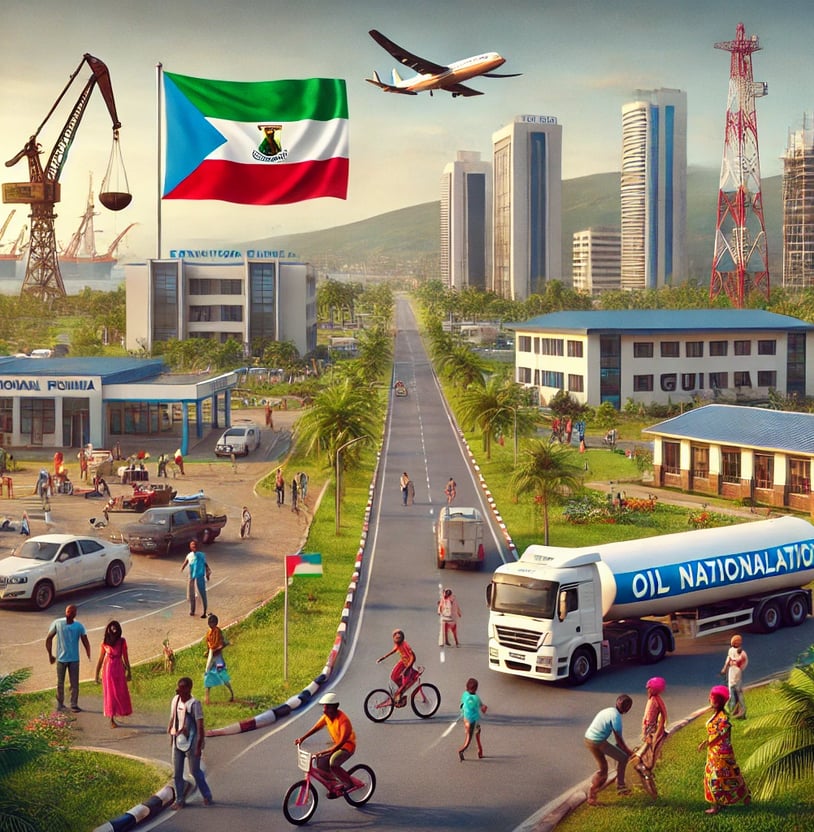Nationalizing National Oil: Ensuring Fair Distribution and Progress in Africa and Equatorial Guinea
In many African countries, including Equatorial Guinea, the oil sector has been a significant source of income and economic development. However, the distribution of benefits from the exploitation of these resources has historically been imbalanced. Nationalizing oil is a necessary measure to ensure that natural resources benefit the nations and their citizens rather than enriching a handful of foreign and private companies.
POLITICS & SOCIETYFINANCE & ENERGY
12/21/20242 min read


The Current Situation
Currently, in many African countries, most oil and gas resources are controlled by foreign companies. This model has resulted in an unfair distribution of wealth, where approximately 75% of the benefits go to these foreign companies, 20% to national private companies, and only a meager 5% is retained by the State. This situation is not only unsustainable but also a barrier to the country’s development and prosperity.
What Does Nationalizing Oil Mean?
Nationalizing oil means that the State takes full control and ownership of the country’s oil and gas resources. This means that all extraction, production, and commercialization operations would be managed by true state entities and not for the benefit of elite groups and foreign interest. The main goal is to ensure that a greater proportion of the benefits derived from these resources stay in the country and are used for social and economic development.
Benefits of Nationalization
Redistribution of Wealth: By nationalizing oil, the generated revenues can be more equitably redistributed among the population. This can fund infrastructure projects, education, healthcare, and other essential public services.
Economic Independence: Nationalization reduces dependency on foreign companies and allows the country to have greater control over its economy. This is crucial for national sovereignty and making decisions that directly benefit the country and its people.
Sustainable Development: With state control, a more responsible and sustainable management of natural resources can be implemented, ensuring they are used in ways that benefit present and future generations.
Job Creation: Nationalization can create local jobs by needing a workforce to operate and manage the oil sector. This not only reduces unemployment but also promotes the development of local skills and capacities.
Successful Examples
Several countries worldwide have demonstrated the benefits of nationalizing their natural resources. Norway, for example, has managed its oil through the state-owned company Equinor, ensuring that oil revenues are used for the welfare of its citizens. Venezuela, despite its challenges, has also shown how nationalization can empower a country to make sovereign decisions about its resources.
The Path Forward for Equatorial Guinea
For Equatorial Guinea, nationalizing oil is not just a viable option but an urgent necessity. The country's oil wealth must be used to drive development and improve the quality of life for all its citizens. The government must establish a robust and transparent state-owned company to manage oil resources and ensure that benefits are distributed fairly and equitably.
In conclusion, nationalizing oil is a crucial step to ensure that the natural resources of Africa and Equatorial Guinea benefit their true owners: their citizens. It is time for Africa to take control of its destiny and use its wealth to build a prosperous and sustainable future for all.
Conclusion
Nationalizing oil is a strategic move to ensure economic and social justice in Equatorial Guinea and across Africa. It is a measure that not only ensures a fairer distribution of wealth but also strengthens national sovereignty and promotes sustainable and responsible development. It is time for Africa to take control of its resources and use its wealth for the benefit of its people.


